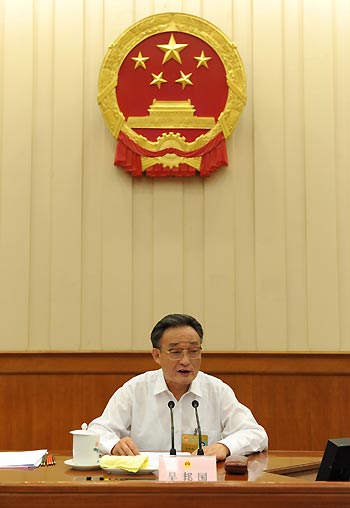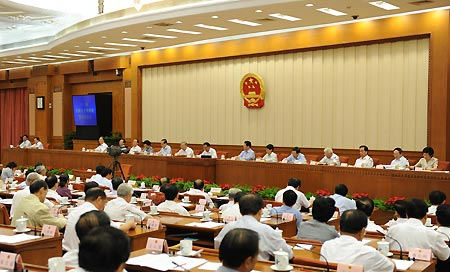China's top legislature concluded its four-day, bimonthly session Thursday, after approving the country's first armed police law and climate change resolution.
|

|
|
Wu Bangguo, chairman of the China's National People's Congress (NPC) Standing Committee, presides over the 10th session of the Standing Committee of the 11th NPC in Beijing, China, Aug. 27, 2009. The 10th session was closed on Thursday in Beijing. [Xinhua]? |
Top legislator Wu Bangguo told the closing meeting of the 10th session of the Standing Committee of the 11th National People's Congress (NPC) that the new armed police law clarified the nature, command mechanism, responsibilities, duties and rights of the paramilitary force.
"It offers solid legal backing for the armed police to complete the country's security tasks, maintain social stability and safeguard the legitimate rights and interests of citizens and organizations," Wu said.
Climate change has been an issue of concern among lawmakers.
Wu said the newly-approved resolution was an "important achievement" and a significant measure taken by the top legislature to deal with the global challenge.
Wu, chairman of the NPC Standing Committee, said the resolution praised the government's work on climate change, emphasized the importance of the issue, clarified guidelines, basic policies, measures as well as China's stance.
He said lawmakers proposed many suggestions on a climate change report, presented by the State Council (Cabinet), and a draft of the resolution.
Lawmakers agreed climate change was a challenge faced by all humankind and needed international cooperation.
Wu said China "as a responsible nation" had been focusing on the issue, set energy efficiency and environmental protection as basic state policies and achieving sustainable development as national strategies.
He said the country had made laws and regulations to climate change and set energy saving and emissions reductions as binding targets in the state's medium and long-term development plan.
|

|
|
The 10th session of the Standing Committee of the 11th National People's Congress (NPC) is held in Beijing, China, Aug. 27, 2009. The 10th session was closed on Thursday in Beijing. [Xinhua] |
The country had "actively participated international cooperation on climate change and made contributions in mitigating and adapting to climate change."
He said the NPC Standing Committee "actively" made and improved laws related to the issue, listened to work reports regularly and conducted law enforcement inspections on resources and environment, which offered great support to the work of the government.
The top legislature also agreed Thursday a legislation overhaul with the updating and revision of 141 provisions in 59 different laws.
Wu said the collective updating and revision of laws was an important step to ensure a legal system with Chinese features would become "more scientific, unified and harmonious" and form a complete socialist legal system by 2010.
"The law revisions at this session solve the problem that some laws and regulations are incompatible with the economic and social development," he said.
This was the second legislation overhaul after the NPC Standing Committee in June agreed to abolish eight outdated and redundant laws, including one covering police stations that dated back to 1954.
Wu said the next step was to revise laws quickly, and asked government departments to enact regulations to help implement the laws, and streamline local regulations.
He said one of the focuses of the NPC's supervision work was to oversee the economy. One of the roles of NPC Standing Committee was supervision of the government.
He said due to the complicated domestic and overseas economic situation, the NPC took supervision of the implementation of the government's important decisions as top priority.
Each legislative session since April had deliberated work reports of some government departments, he said.
The NPC Standing Committee also investigated topics such as affordable housing construction at the suggestion of lawmakers. It would also supervise the implementation of the central government's public investment plan valued at 908 billion yuan (133.5 billion U.S. dollars) this year, part of the 4-trillion-yuan stimulus plan initiated late last year.
Wu said the investigation report on low-rent housing would be submitted to a legislative session in October.
"Such work plays an important role in promoting the implementation of central government decisions and stable and relatively fast economic development."
Wu said this session listened to a routine report on the implementation of the government's plan of economic and social development, as well as a report on economic restructuring and transforming the development model.
Lawmakers agreed that although the economy suffered a big drop during the fourth quarter last year, the 7.1-percent GDP growth in the first half of this year showed sound momentum, "which was not easy and a result of the efforts of the whole country."
Wu said it showed that the central government's decision of dealing with the impact of the global economic downturn was "completely correct" and the measures taken were "timely and effective."
Legislators said efforts should be made to ensure this year's economic and social development goals could be achieved.
The top legislature also accepted Thursday the resignation of Cui Mingjie, an entrepreneur of central Henan Province, from his post as NPC deputy, for alleged involvement in "serious economic crimes."
It also approved the expulsion of two NPC deputies -- Xu Zongheng, former mayor of south China's Shenzhen City, and Liu Youjun, director of the Guangdong provincial department of labor and social security -- for "serious violations of discipline."
According to the Credentials Committee of the NPC Standing Committee, the total number of deputies to the 11th NPC stands at 2,979.